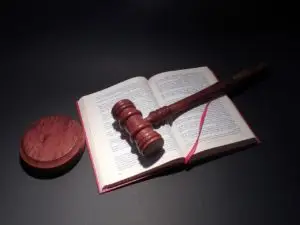
Individuals in California can only practice law if they are current, active members of the California State Bar. This means that individuals can be charged under California Business & Professions Code Section 6126(b): Practice of Law by an Inactive Member of the State Bar if they are suspended or disbarred and continue to practice law.
Focus on the details of a BPC 6126(b) charge here with the Simmrin Law Group. You can also go over other aspects of BPC 6126 and the results of a conviction for the practice of law by an inactive member of the state bar.
Practice of Law by an Inactive Member of the State Bar: Definition
Only current members of the California State Bar may practice law in the state. According to BPC 6126(b), individuals may not practice law if they are:
- Disbarred from the State Bar
- Suspended Members of the State Bar
Additionally, individuals who were forced to resign due to pending criminal charges may not practice law. Finally, the state forbids individuals who were involuntarily enrolled as inactive members of the State Bar from practicing law in any way.
Note that California does not clearly define what “practicing law” entails in BPC 6126(b). However, court cases over the years have clarified the issue. BPC 6126(b) charges can apply if an ineligible individual:
- Offers Legal Advice or Counsel
- Develops a Contract to Secure Legal Rights
- Sets up Legal Instruments
- Provides Services Tied to Litigation or Court Cases
Other Aspects of BPC 6126
BPC 6126 does not only deal with the practice of law by inactive members of the State Bar. In fact, California Business & Professions Code Section 6126(a) can be used to prosecute non-lawyers who attempt to practice law in California.
Non-lawyers generally face less severe penalties for a conviction under BPC 6126. Both acts can be considered white collar crimes. Convictions under either BPC 6126(a) or BPC 6126(b) can have harsh repercussions.
Focus on BPC 6126(b) Examples
Man A stood as a lawyer in good standing with the State Bar for a number of years. However, he was recently disbarred for a serious legal infraction. He decides to continue representing his clients. He could be charged with the practice of law by an inactive member of the State Bar.
Man B was involuntarily enrolled as an inactive member of the State Bar after his drug addiction was discovered. He was not aware of this change to his membership status and continued to practice law. He could avoid a BPC 6126(b) conviction because he was not aware that he was an inactive member of the State Bar.
Results of a BPC 6126(b) Conviction in California
As we mentioned, the penalties for a BPC 6126(b) conviction can be severe. Inactive members of the State Bar who practice law may be sentenced to:
- Jail Time: Up to three Years
- Fines: Up to $10,000
The court will sometimes sentence an individual to probation instead of jail time. During the probationary period, an individual must obey all regulations set down by the court. Failure to adhere to court-mandated guidelines can result in a probation violation, which can be treated as another criminal charge.
Possible Legal Defenses for BPC 6126(b) Charges
There are legal defenses that can be used to handle a BPC 6126(b) charge. You can get help reviewing possible defenses for your case by contacting a criminal defense lawyer in Los Angeles right now. Your lawyer may be able to show that:
You Didn’t Know You Couldn’t Practice Law
In some cases, individuals may avoid charges if they were unaware of their ineligibility to practice law. This only applies if you were involuntarily made an inactive bar member. This defense does not apply if an individual is disbarred, for example. However, if you were unaware that you had been placed on inactive bar member status, you could avoid a BPC 6126(b) conviction.
You Weren’t Practicing Law
As we mentioned, California does not offer a highly specific definition of what “practicing law” entails. Some cases are obvious if they involve acts traditionally associated with the practice of law – like representing a client in court. However, in some situations, a lawyer may be able to show that you were not actually practicing law as an inactive member of the State Bar.
Get Help Handling BPC 6126(b) Charges
California Business & Professions Code Section 6126(b): Practice of Law by an Inactive Member of the State Bar charges can lead to harsh penalties. The criminal defense lawyers at the Simmrin Law Group can help you prepare to face a BPC 6126(b) accusation. Contact us now for a FREE case evaluation of your situation.
You can speak with a legal professional today by calling (310) 896-2723, or filling out our online contact form.
